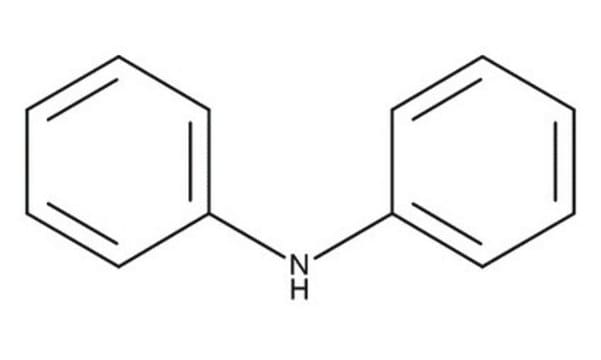33149
Diphenylamine
puriss. p.a., redox indicator, ACS reagent, reag. Ph. Eur., ≥98% (GC)
About This Item
Produits recommandés
Qualité
ACS reagent
redox indicator
puriss. p.a.
Niveau de qualité
Agence
reag. Ph. Eur.
Densité de vapeur
5.82 (vs air)
Pression de vapeur
1 mmHg ( 108 °C)
Pureté
≥98% (GC)
Température d'inflammation spontanée
1175 °F
Technique(s)
titration: suitable
Impuretés
≤0.01% insoluble in ethanol
Résidus de calcination
≤0.03% (as SO4)
Point d'ébullition
302 °C (lit.)
Pf
50-53 °C (lit.)
52.5-54.0 °C
Traces d'anions
nitrate (NO3-): in accordance
Traces de cations
Fe: ≤10 mg/kg
Chaîne SMILES
N(c1ccccc1)c2ccccc2
InChI
1S/C12H11N/c1-3-7-11(8-4-1)13-12-9-5-2-6-10-12/h1-10,13H
Clé InChI
DMBHHRLKUKUOEG-UHFFFAOYSA-N
Informations sur le gène
human ... UGT1A4(54657)
Vous recherchez des produits similaires ? Visite Guide de comparaison des produits
Description générale
Application
Conditionnement
Mention d'avertissement
Danger
Mentions de danger
Conseils de prudence
Classification des risques
Acute Tox. 3 Dermal - Acute Tox. 3 Inhalation - Acute Tox. 3 Oral - Aquatic Acute 1 - Aquatic Chronic 1 - STOT RE 2
Organes cibles
Kidney,Liver,spleen
Code de la classe de stockage
6.1C - Combustible acute toxic Cat.3 / toxic compounds or compounds which causing chronic effects
Classe de danger pour l'eau (WGK)
WGK 3
Équipement de protection individuelle
dust mask type N95 (US), Eyeshields, Faceshields, Gloves, type P2 (EN 143) respirator cartridges
Faites votre choix parmi les versions les plus récentes :
Déjà en possession de ce produit ?
Retrouvez la documentation relative aux produits que vous avez récemment achetés dans la Bibliothèque de documents.
Les clients ont également consulté
Notre équipe de scientifiques dispose d'une expérience dans tous les secteurs de la recherche, notamment en sciences de la vie, science des matériaux, synthèse chimique, chromatographie, analyse et dans de nombreux autres domaines..
Contacter notre Service technique










